 DC Comics
DC ComicsDecember 2004
Writer: Brad Meltzer
Penciller: Rags Morales
Inker: Michael Bair
If you ever want to pick a fight at a convention or a comic store, just mention Identity Crisis. Little in recent superhero territory has been as controversial, or as critically acclaimed.
At its most basic level, Identity Crisis is a murder mystery, written by Brad Meltzer, veteran of the genre. Someone is threatening those closest to the DC heroes, which means that someone knows the secret identities of even top tier good guys like Superman; and during the course of the investigation it is revealed that the Justice League has been performing magical lobotomies on C-list villains for decades.
The mystery is a good one, but the story functions best on a basic human level: Superman rushing out the door of the Kent's farm and into the Smallville sky, "Pa, do me a favor and lock the doors."; Ralph Dibny, the Elongated Man, rushing to his wife's smoldering corpse, his arms and face drooped to their limit with grief; the Atom shrinking away into oblivion, destroyed by his wife's betrayal.
Meltzer does first and foremost what any good novelist should do, which is get you deep into the heads of the characters. Green Arrow, political conscience of the JLA, is the pivot point for the big reveals in the book, but Meltzer also breathes life into previously irredeemably goofy characters like the Captain Boomerang and The Calculator.
Rags Morales provides the art, and he's spectacular here. In his theatrical expressions and open layout he's very reminiscent of the great Will Eisner. Also, he has Eisner's sense of using posture as a way to convey character (usually only animators do this well, for some reason comic artists usually don't bother). Without Rags' contributions Identity Crisis would have still been a good read, but with him it's a classic.
Father's Day is the fifth of seven issues. The previous issue ended with Lois Lane receiving a note that read: I know who your husband is, You're Next.
Five opens with the fallout: teams of adrenaline crazed superheroes on a rampage, desperately hunting for information.
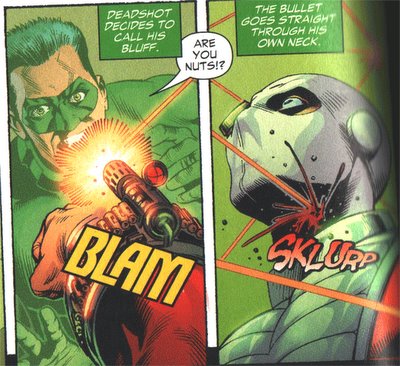
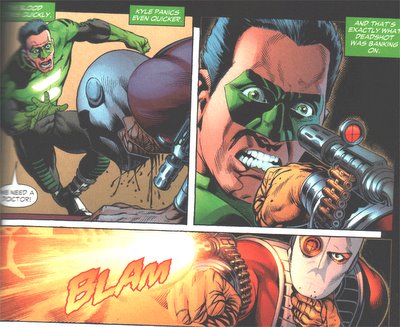 Meltzer and Morales create a palpable tension, and a real sense that every hero is at their breaking point.
Meltzer and Morales create a palpable tension, and a real sense that every hero is at their breaking point.  Finally, there is a casualty in the rushing confusion, as Firestorm is pierced by Shining Knight's sword and explodes in the sky above his companions.
Finally, there is a casualty in the rushing confusion, as Firestorm is pierced by Shining Knight's sword and explodes in the sky above his companions.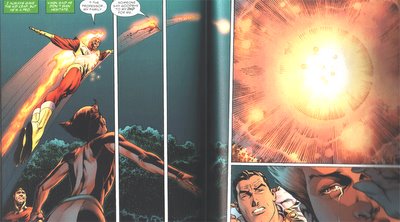 I have no particular affinity for Firestorm, but the sequence is heartbreaking. Look at the way Morales plays with time in his panels, holding onto those last moments of his flight as Firestorm becomes just a glowing ball over the horizon (Scott McCloud would surely have a thing or two to say about how only the medium of comics could have portrayed this scene in this way, with that kind of lingering impact. Lucky for you, I'm not Scott McCloud).
I have no particular affinity for Firestorm, but the sequence is heartbreaking. Look at the way Morales plays with time in his panels, holding onto those last moments of his flight as Firestorm becomes just a glowing ball over the horizon (Scott McCloud would surely have a thing or two to say about how only the medium of comics could have portrayed this scene in this way, with that kind of lingering impact. Lucky for you, I'm not Scott McCloud). Then the gorgeous, silent supernova as a hero dies.
The bulk of Issue Five is given over to the story of two sets of fathers and sons. First is Captain Boomerang, Flash's long suffering nemesis, and his son Owen, who he's just recently reunited with. Second, Tim Drake, the current Robin, and his father Jack who has just learned exactly where it is his son goes at nights.
While the Boomerangs gleefully toss their razor tipped and explosive namesakes around in the park; Jack frets endlessly over news coverage of the recent deaths. He is torn by fear and admiration. His son is a hero, a superhero even, and he has at a young age become a man his father has never been.
 He wants his son safe, but he knows the world is safer with him out fighting for it.
He wants his son safe, but he knows the world is safer with him out fighting for it. Captain Boomerang is given new life by his son's pride. He's no longer a has-been or a never-was, he's an immediate and terrifying danger.
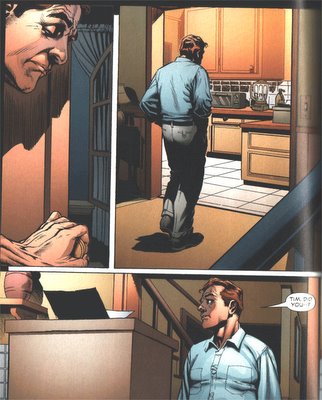
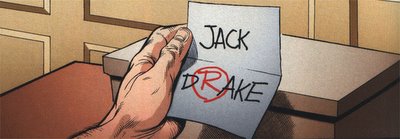
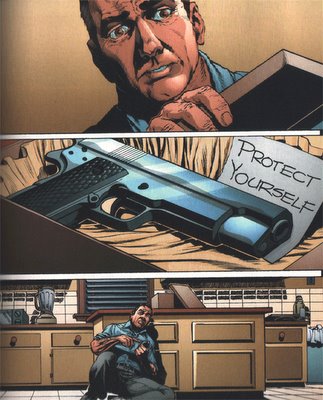 The horror of this moment is made all the more real by how mundane the set-up is. Jack says goodbye to his son and shuffles into the kitchen, and within moments is crouched on the floor; in one shaky hand a gun, in the other Tim's Teen Titans communicator. Oracle patches the feed into the Batmobile, and it becomes a panicked race against time to get Tim home.
The horror of this moment is made all the more real by how mundane the set-up is. Jack says goodbye to his son and shuffles into the kitchen, and within moments is crouched on the floor; in one shaky hand a gun, in the other Tim's Teen Titans communicator. Oracle patches the feed into the Batmobile, and it becomes a panicked race against time to get Tim home. In his fear and vulnerability there is no more Robin, only Tim Drake, tiny and helpless, listening to his father die.
Rags handles this moment perfectly. He shows, for the first time in the book, just how young Tim really is:
 But, more importantly, the expression on Batman's face when he sees how young Tim is, and remembers not only his own loss, but Dick Grayson's and Jason Todd's.
But, more importantly, the expression on Batman's face when he sees how young Tim is, and remembers not only his own loss, but Dick Grayson's and Jason Todd's. 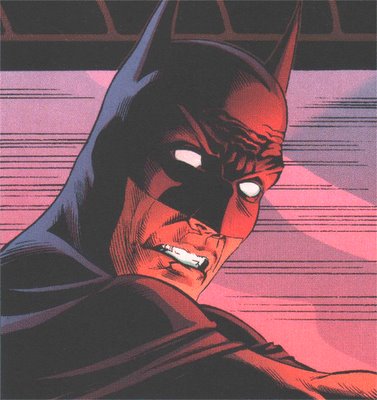 Bruce Wayne, eternally cursed to relive the tragedy that drove him to the shadows. Batman, more than any other hero, wallows in his suffering. He has become his grief and rage. He bears the collective guilt of the DC Universe on his shoulders. He chose to fight crime, but in fighting crime he only ever brought it to his doorstep. That guilt is what Identity Crisis is about. As he drives Tim home, with each moment knowing it's a futile effort, all Bruce can say is, "Not again."
Bruce Wayne, eternally cursed to relive the tragedy that drove him to the shadows. Batman, more than any other hero, wallows in his suffering. He has become his grief and rage. He bears the collective guilt of the DC Universe on his shoulders. He chose to fight crime, but in fighting crime he only ever brought it to his doorstep. That guilt is what Identity Crisis is about. As he drives Tim home, with each moment knowing it's a futile effort, all Bruce can say is, "Not again." The power in the final moments of the book lie in their deafening silence. It's a great comic writer who knows when to trust his artist, and Meltzer lets Rags tell the story. The snarling pride in Captain Boomerang's face as he crashes through the door. The tears streaming down Jack Drake's face as he fires.
The power in the final moments of the book lie in their deafening silence. It's a great comic writer who knows when to trust his artist, and Meltzer lets Rags tell the story. The snarling pride in Captain Boomerang's face as he crashes through the door. The tears streaming down Jack Drake's face as he fires. 
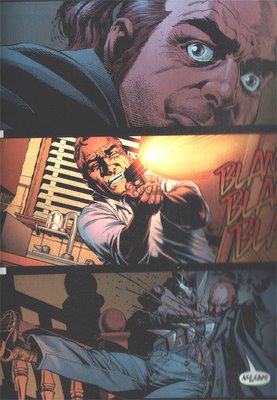 The ultimate futility of both men caught in a snare larger than either of them imagined, bleeding their life out together.
The ultimate futility of both men caught in a snare larger than either of them imagined, bleeding their life out together. 
Identity Crisis forever changed what was possible in the DCU. For the better or the worse is a matter of opinion. In fact, much of what is being termed as negative about the DCU (and therefore, in need of negation) over in the ongoing Infinite Crisis stems from the brutal drama of Identity Crisis. But the story is about the choices that people make, whether it's putting on a cape or signing divorce papers, and the very real consequences of even the smallest act.
(Hate Idenity Crisis? You're not alone...)

2 comments:
Very impressive -- even if I disagree with the top-ten standing of several of your choices you're going all-out to explain why you rate them so highly, which is more than most funnybook bloggers can do.
I'm estranged from most of my comics collection so I won't even attempt to make my own list -- but my #1 was going to be EIGHTBALL issue 16.
If this list wasn't limited to the majors, I'd definitely pick Eightball 22, the Ice haven issue. Maybe I'll do a Fantagraphics best of.
Post a Comment